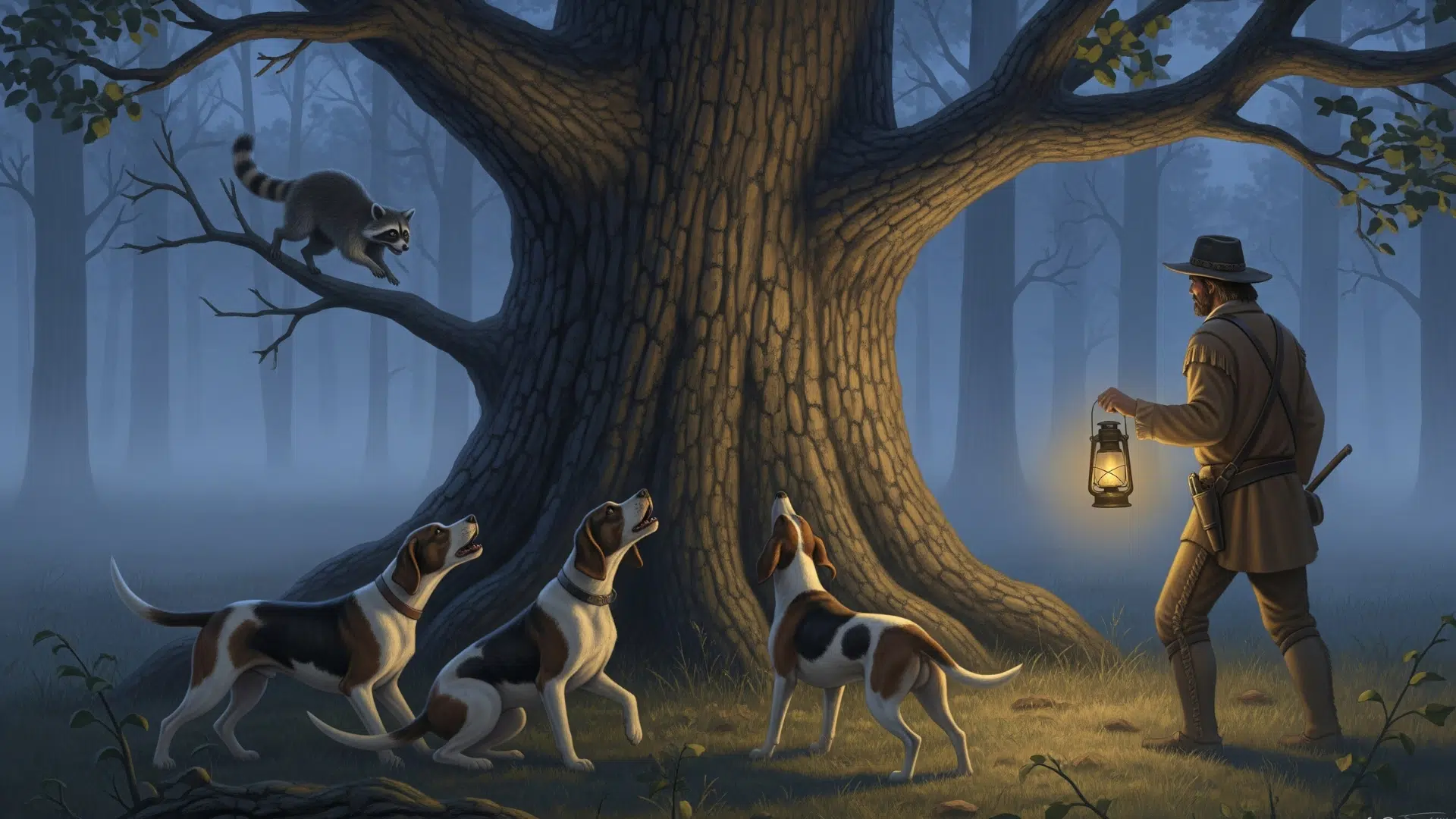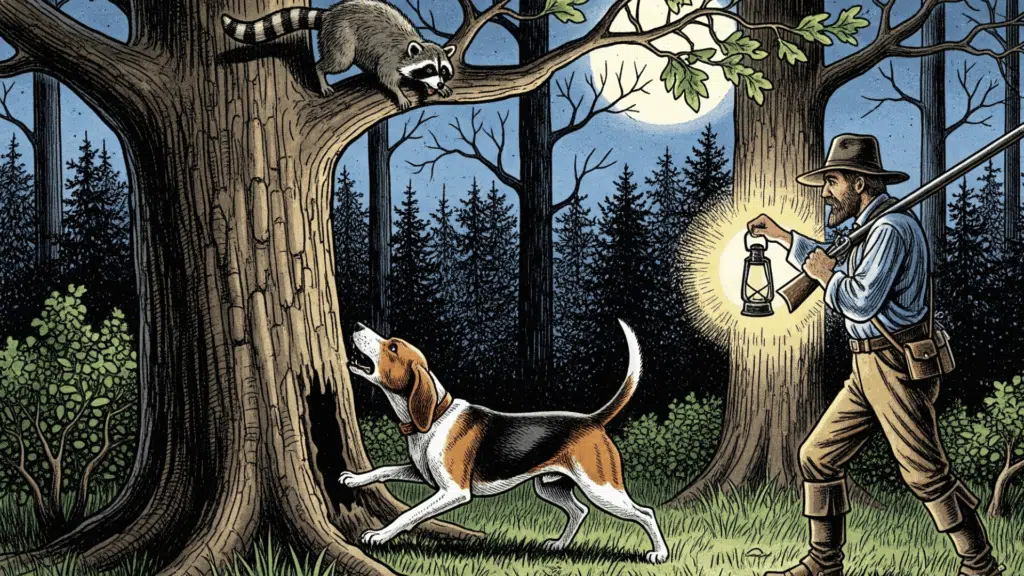We’ve all been there: chasing the wrong lead, blaming the wrong person, or putting our energy into something that’s never going to work out.
When that happens, someone inevitably says we’re “barking up the wrong tree.” It’s such a common phrase that we barely think about it anymore. But have you ever wondered where this quirky expression originated?
The story behind these six simple words is more interesting than you might expect. It involves clever animals, frustrated hunters, and a slice of American history that shaped how we talk about mistakes and misdirected efforts.
Let’s dig into how a particular situation became one of our most enduring idioms.
The Modern Meaning of the Phrase ‘Barking Up the Wrong Tree’
“Barking up the wrong tree” means you’re pursuing the wrong course of action or blaming the wrong person. You’re putting your energy into something that won’t get you the results you want. It’s like knocking on a door when nobody’s home.
This idiom captures that frustrating moment when you realize you’ve been focused on the wrong target all along.
Similar expressions include “on the wrong track,” “missing the mark,” or “going down the wrong path.” You might also hear people say they’re “looking in the wrong place” or “chasing shadows.”
The beauty of this expression lies in its perfect capture of that “oops” moment when you realize you need to redirect your efforts entirely.
Tracing the Origin of the Phrase ‘Barking Up the Wrong Tree’

The origin story of “barking up the wrong tree” begins in the rugged wilderness of early 19th-century America, where survival often depended on one’s ability to hunt.
And when it came to nocturnal hunting, few quarry were as prized, or as tricky, as the raccoon.
The Art of Coon Hunting
Raccoon hunting wasn’t just a sport; it was serious business. These masked bandits raided cornfields and chicken coops, making them both pest and prize.
However, hunting them required a unique kind of partnership between the hunter and the hound. Coonhounds, typically breeds like the Black and Tan Coonhound or Redbone Coonhound, possess an incredible sense of smell and the stamina to track prey through miles of dense forest.
The hunt would begin at dusk. Dogs would pick up a raccoon’s scent trail and follow it with single-minded determination, their baying echoing through the trees.
When the raccoon finally climbed a tree to escape, the dogs would surround it and bark incessantly; a behavior known as “treeing.” This signal indicated exactly where to find the hunter’s quarry.
When Things Go Wrong in the Woods
Raccoons are brilliant creatures. They’d often pull a vanishing act that would make Houdini jealous.
Picture this: a raccoon scrambles up a massive oak tree with a pack of hounds hot on its trail. The dogs arrive seconds later, circling the base and barking with absolute conviction. The hunter approaches with his lantern, ready to claim his prize.
Except the tree is empty. The raccoon has already leaped to a neighboring tree, then another, before dropping silently to the ground and disappearing into the night.
Meanwhile, the faithful hounds continue their vigorous barking, entirely convinced they’ve got their target cornered.
The Phrase Takes Root
The first documented use of “barking up the wrong tree” appeared in James Kirke Paulding’s 1813 collection, “The Lay of the Scottish Fiddle,” although the expression had likely been circulating campfires for years.
By the 1830s, it had found its way into the famous Davy Crockett almanacs, cementing its place in American folklore. What started as hunters’ slang quickly spread beyond the forests.
The phrase perfectly captured a universal human experience: that moment when you realize you’ve been pursuing the wrong solution, blaming the wrong person, or looking in the entirely wrong place.
From frontier cabins to city streets, Americans accepted this colorful way of describing misdirected effort.
Modern Examples in Action
The phrase barking up the wrong tree origin has become a seamless part of our daily conversations. Here’s how it sounds in real-world situations:
Business Context: “The marketing team spent three months trying to increase sales by targeting millennials, but they were barking up the wrong tree – our data showed Gen Z was actually driving most purchases.”
Relationship Drama: “Sarah confronted her roommate about leaving dishes in the sink, only to discover her boyfriend had been the messy culprit all along. She’d been barking up the wrong tree for weeks.”
Tech Troubleshooting: “I spent two hours reinstalling my graphics drivers to fix the game lag, but I was totally barking up the wrong tree – turns out my internet connection was just terrible.”
Workplace Humor: “When the office printer kept jamming, everyone blamed the new intern. Turns out the IT guy had been using the wrong paper size for months. We were all barking up the wrong tree.”
Family Life: “Mom accused dad of eating her leftover pizza, complete with a full interrogation. Meanwhile, the dog was quietly licking sauce off his whiskers. She’d been barking up the wrong tree – literally.”
Academic Setting: “Professor Johnson spent the entire semester assuming students weren’t doing the reading because they seemed confused. He was barking up the wrong tree – his lecture slides were just impossible to follow.”
Each example shows how naturally this 200-year-old hunting metaphor fits into modern life, proving that good expressions never really go out of style.
List of Similar Phrases to ‘Barking Up the Wrong Tree’
The phrase “barking up the wrong tree” isn’t the only way to express a misguided effort or a mistaken assumption.
English offers a range of colorful alternatives that capture similar moments of confusion or misdirection. Here are a few phrases that carry the same punch.
1. On the wrong track: Following an incorrect approach or idea; not moving toward the desired outcome.
2. Missing the mark: Failing to achieve a goal or misunderstanding the point entirely.
3. Going down the wrong path: Taking a course of action that leads away from success or truth.
4. Clutching at straws: Desperately trying unhelpful or unlikely solutions when all other options have failed.
5. Chasing shadows: Pursuing something that doesn’t exist or can’t be caught; wasting effort.
6. Tilting at windmills: Fighting imaginary enemies or pursuing unrealistic goals, acting on a false premise.
7. Grasping at thin air: Trying to understand or hold onto something that isn’t there or doesn’t make sense.
8. Looking in the wrong place: Searching or blaming where there’s no chance of finding the correct answer or person.
9. Making a mountain out of a molehill: Exaggerating a small problem or misunderstanding into a big issue.
10. Biting the wrong bullet: Taking a brave stand or accepting hardship, but for the wrong reason or in a bad situation.
11. Shooting in the dark: Making guesses or taking action without having enough information.
12. Pursuing a red herring: Being distracted by irrelevant information or a misleading clue.
13. Going off on a tangent: Diverting from the main topic or issue, often irrelevantly or unnecessarily.
14. Hitting a dead end: Reaching a point where no progress can be made; efforts no longer yield any results.
15. Beating a dead horse: Wasting time on something that’s already been settled or won’t yield results.
To Conclude
From those moonlit forests of early America to today’s digital chaos, barking up the wrong tree origin has proven its staying power.
What started as frustrated hunters watching their dogs chase shadows has become the perfect way to describe our modern mishaps and misdirected efforts.
The next time you catch yourself confidently pursuing the wrong solution, whether it’s blaming the wrong coworker, chasing the wrong romantic interest, or troubleshooting the wrong tech problem, remember those clever raccoons who started it all.
They taught us that sometimes the most obvious answer isn’t the right one. This humble hunting phrase reminds us to pause, reassess, and maybe check a different tree entirely.














